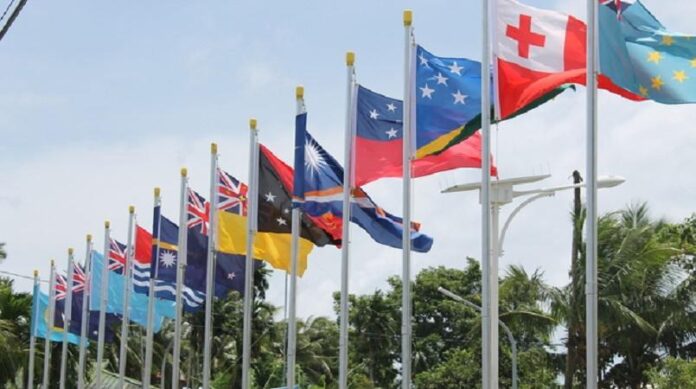By MICHELLE AUAMOROMORO in Suva, Fiji
THE Pacific region had always been one of the most costly places in the world to do business, says Zarak Khan, Director of Programmes and Initiatives at Pacific Islands Forum (PIF).
“Before the supply chain crisis and the COVID-19 pandemic, the Pacific was already one of the highest costly places in doing business,” he said.
Mr. Khan clarified that this had been because of the challenges faced by the region, which included the geographical spread of the counties, and connectivity challenges in terms of shipping and air services.
“And now with the COVID-19 experience, what we’re facing with the Russia-Ukraine war, the increase in fuel prices, and the problems that the shipping companies are facing around the world with the supply chain issues have made the cost of doing business in the pacific even worse, if I can perhaps put it that way,” he added.
The PIF Secretariat, which carries the trade mandate, had been supporting the member states as a trade mandate to address these issues through policy negotiations, developing trade policies, and also in terms of implementing the trade-related policies.
Mr. Khan said they had embarked on doing a supply chain study over the last few months to find out some of the drives of the challenges that the Pacific countries were facing in trade.
“That report has just been finished and we will be taking that to the Forum Economic Ministers Meeting next month in Port Vila to have a look at and deliberate upon,” he said.
Mr. Khan added that some of the things they discovered in their study were not surprising.
He said a lot of them were to do with things that couldn’t be controlled but improvable.
“We can’t control the price of fuel and oil globally, we can’t control the shipping companies, and we can’t control the market directly but what we can do is improve on the trade facilitation side of things in terms of the cost effect that our traders and the exporters and businesses have to face in terms of clearing the containers at the port.
“We have, unfortunately, some of the worst performing statistics when it comes to the time that it actually takes for the containers to be cleared in our ports and the additional charges that our importers or exporters have to pay when it comes to supporting that process,” said Mr. Khan.
“And these are things that are within the control of our respective governments; it requires having the right policies, the right regulations, getting a much more coordinated approach from the different agencies in the front line and clearing up containers or products that are coming in.
“In the future, we are looking at technology to play a much greater role in terms of automation process that will hopefully speed things up,” he said.
Khan added that they also looked at the trade experiences of other countries.
“We looked at countries like Vanuatu for example where they have an Electronic Single Window System which they have already adopted and implemented.
“They are one of the best performing in terms of implementation of the Vanuatu Trade Policy Framework where they have trade development committee and the customs and border control agencies work hand in hand.
“In sharing their experience with other pacific countries, perhaps maybe they’ll be the model in some of the practices that can be adapted in some of the other countries,” he said.
Khan also mentioned that the primary framework that they are currently working on was called the Pacific Aid for Trade Strategy 2020-2025 that had four main priorities of which two had already been launched and in the midst of implementations.
“The first of which is called the Pacific Quality Infrastructure Initiative, focusing largely on standards, metrology, ensuring that our Pacific people are able to receive goods and services, which are of good standard, and our exporters are able to export products, meeting the standards in Australia, New Zealand and in some of our key partner countries.
“The second initiative is called the Regional eCommerce Initiative and Roadmap.
“This focuses on working with our partner agencies to develop ecommerce capacity within the Pacific region, address significant issues related to payment gateways, cybersecurity, consumer protection, protection of data, intellectual property, and a number of other issues.”
Kahan said the next two priorities, from the four, that they were looking at were in relation to trade facilitation.
“This is a major global issue at the moment, especially with the supply chain problems the world is facing, it’s resulted not just in terms of the increasing cost of fuel, but the supply chain issues are also responsible for the inflation and the increased cost of living that our people are facing.
“A good example is the cost of a container from Sydney to Fiji at the moment; it’s doubled in cost from about $4,000 FJD to about $8,000.
“And so that’s due to the glut in terms of the lack of containers to actually carry the goods, but also in terms of the influx in demand because of the fact that we’re coming out of COVID.
“This increased demand in the global economy at the moment.
“Unfortunately, because the Pacific are price takers, we’re facing the full brunt of this price increases and unfortunately, people are facing those impacts as well.
“So trade facilitation is a means of trying to reduce the costs of trade, trying to improve the manner in which our frontline agencies, which is customs, or quarantine, biosecurity, health agencies work together to process goods, which are coming through our borders.”


